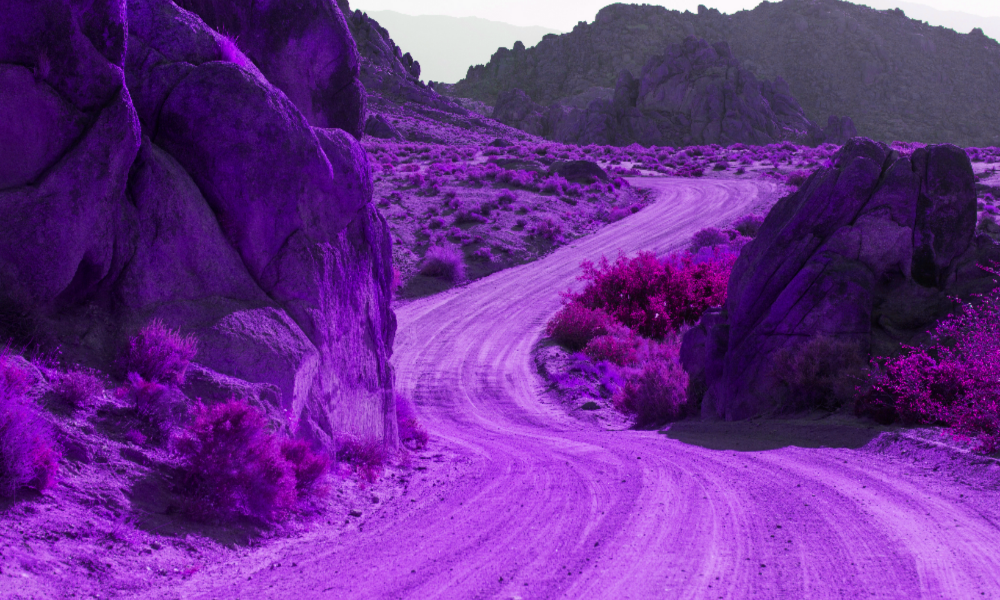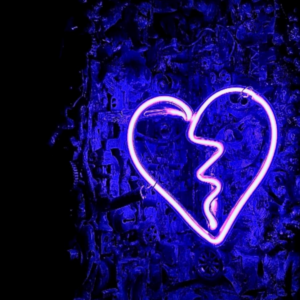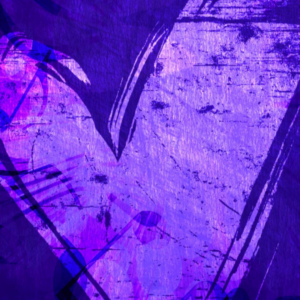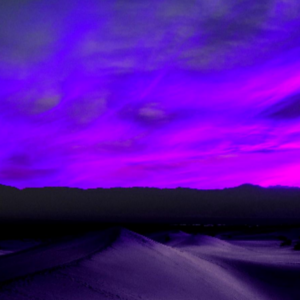Finalist in the Voyage YA Short Story Award
Content warning: references to death
.
“Raspberry or lemonade?”
Jacinta rested her head against the passenger window. Outside, a scrawny misfit with an outdated footy jersey and IQ one quarter the going rate for diesel manned the pump, a faraway look in his eye.
“Jaz? Raspberry or lemon?”
“Whatever.”
She gazed through the glass at nothing in particular, waiting for her father to finally close the door. Lifting her head, she followed his careful progress across oil-stained concrete to the roadhouse.
Back stooped.
Shoulders hunched.
Maybe it was the long hours at the wheel, but he moved like an old man, as if pressed down under some great weight. He paused wearily at the threshold, before fighting his way through the dangling plastic fly-flaps and disappearing into the roadhouse.
With a heavy sigh, she rolled her head back against the glass. Each warm breath clouded its surface, coaxing to life old smears and finger-marks and hastily-sketched smiley faces like fading ghosts from happier days. She gazed out through the windscreen: flat, dry, and barren. No movement, but for the sickening shimmer of heat relentlessly rising from baked earth and angry stone.
Just like the last three hundred kilometers.
Right now her classmates were rugging up and heading off with their families to the snowfields. Here she was driving through a heatwave with her dad, across the surface of the moon.
They’d set off on a gloomy afternoon in Sydney to the distant promise of scattered showers. When she first slid into the car, there’d been the faintest whiff of her mum’s favorite perfume. But that was four days ago. Now all she could smell was dust and sweat and baked vinyl.
“Bit of a hot one,” came her father’s voice faintly.
‘Yep,” replied the pump attendant.
“Any rain lately?”
“Nope.”
Jacinta tapped half-heartedly at the list of friends on her phone, even though they’d already lost reception hours ago. Right now, she imagined, Laura and Rosie would be well and truly in holiday mode. They’d be planning movie nights and exchanging school gossip and plotting surreptitious rendezvouses with Jason McKenzie at the local takeaway. They’d be laughing and teasing and joking and singing; loud, brash, shameless. Because that’s how Laura and Rosie were: carefree, confident that life was theirs for the taking. But then, Laura and Rosie had never been to a funeral.
“Got you raspberry, hope that’s okay.” Her dad slid into the driver’s seat beside her, an ice-block poised in each hand like an excited drummer. She wordlessly accepted the offering. It was already starting to melt. “Lady in the shop reckons we’ll have a good chance.”
She stared at him blankly.
“To see it!”
Ice-block wedged between his teeth, he groped for the ignition switch and tossed her a glossy brochure as the engine shuddered to life. She glanced dully at the title: The Mysterious Min-Min Light.
“Local farmer spotted it a few nights ago apparently,” he chattered between icy mouthfuls. “There’ve been a few sightings in the last month or so. Most of them just West of here. Just the other day some old bloke was telling everyone.”
Jacinta licked drops of melted raspberry ice from her knuckles and let her mind slowly wander as they rolled back out onto the vacant strip of highway. It was already mid-afternoon but could just as well have been early morning; time stood still out here. Every mile of sprawling desert slid by her window like a tired old movie reel on a never-ending loop. Splashes of cloud hovered against the bright blue, a garish still-life. And no matter where she looked, the sun was always in her eyes.
She shifted in her seat. She toyed aimlessly with the radio static. She wished for the hundredth time she’d remembered to bring her headphones. Now and then she dozed, succumbing to the void and the hypnotic strobe of the broken center line flicking under the bonnet. Even her father soon abandoned any gallant attempt at conversation, lulled mute by the steady hum of rubber and asphalt as the car devoured kilometer after kilometer.
“Beautiful, isn’t it?” he declared suddenly after an hour or two.
She grunted awake, head lolling.
“Huh?”
“All that. Out there.”
Maybe he was seeing something she wasn’t. Everything looked the same through her window. Red-brown plains stretching all the way to the horizon like a becalmed Martian sea. Spatters of spinifex bundles and prickly shrubs. Lifeless. Dull. Flat and flat and flat.
She tried to remember why she’d let him talk her into this trip in the first place. “She always wanted to go back,” he’d told her a month ago. “Your mum. She loved it out there—the big sky, the endless space.”
In the end, Jacinta had finally given in. Partly because she couldn’t bear the pleading sadness in his eyes any longer. Partly because she’d heard her mum talk so often, face glowing, about the desert and all the treasure to be found within that vast landscape, an ancient richness hidden under the veneer of nothingness.
And if someone loved a place that much, mightn’t a part of them somehow linger there still?
“Where are we staying tonight?” she mumbled, wiping drool from her cheek.
“Boulia!” announced her father as if it meant something. “Gateway to the Outback! And the best place to spot the Min-Min.”
He tapped a finger on the pile of brochures scattered across the dashboard. “There’ve been sightings on and off for over a hundred years! A tiny ball of light, floating just above the ground at night. Sometimes it just sits there. But it can move too. It’s been known to follow people for hours.”
A wedge-tailed eagle glided by, a blotch of black against the blue. Jacinta tracked his graceful course with tired eyes, watching him ride the thermals. What could he see, she wondered? What lay beyond these plains, out past all this sand and stone and bleak emptiness? At that moment she longed to be up there with him, untethered, free to drift higher and higher, away from it all, away from everything.
“Or it just vanishes. Like it was never even there! Amazing, eh?”
Jacinta watched the broken road edge ripping away alongside the car, a rushing stream of rubble and time. How long had it been, she wondered? Six weeks? Seven? She sighed. Did it matter? It felt like forever.
They’d all come along to the funeral of course. Some because they’d wanted to, others because it was expected—the red-eyed work-mates and frowning cousins and nameless nobodies from a time before Jacinta even existed. How strange funerals were. The sum of an entire life, all the striving and delighting and twists and intrigue condensed into sixty minutes, punctuated by organ sighs and somber suits and tasteful eyeshadow. And all those unspoken tensions and long-running feuds and catty undercurrents suddenly forgotten, vanishing like the fog of breath on greasy window-glass. But Jacinta hadn’t forgotten. She pictured the grimace of guilt on Aunty Joyce’s face during the eulogy and smirked. The woman had spent longer on her own makeup that morning than she had conversing with her only sister over a lifetime. And now her sister was gone.
“Hmmm. That doesn’t look good.”
She blinked at her dad. He was biting his bottom lip and tapping at the dashboard where a warning light had sprung to life.
“Engine problem,” he mumbled at the tiny green light. “Overheating. Maybe.” He frowned at it long and hard, as if to scare it off. He shook his head. “Better pull over, I guess.”
“Great,” growled Jacinta, rolling her eyes. “Middle of nowhere. No mobile reception. And now we break down.”
“Engine just needs to cool down Jaz, that’s all,” said her dad, scouring the verges for a place to stop. “Twenty minutes and we’ll be back on the road.”
An hour-and-a-half later Jacinta sat cross-legged in the shade of the front wheel, silently irate. The little green dash light had been promptly followed by a blinking orange one and before long a red one also, the Holden eventually concluding it had done enough for one day. Mercifully, the sun was dipping steadily lower, losing some of its sting with each nod towards the horizon. She folded her arms while her dad tinkered under the bonnet muttering about fuses and technology and wondering dammit what the hell had happened to good old-fashioned engines that didn’t need a computer to tell them how to work.
“Dark soon,” he admitted at last, slamming the hood down just a little too hard. “Think we’ll have to spend the night here, love.”
She mustered the most pained expression she could, shaking her head slowly. “It’ll be fine, Jaz. We’ve got the tent and all the camping gear. We’ll find a good spot and set up while there’s still a bit of light. We’re not too far from the town. Tomorrow morning we can flag down another car and hitch a ride to a mechanic.” Was that the hint of excitement in his voice? She stared at him in wordless disbelief. “Promised you an adventure, didn’t I?” he grinned, flipping open the boot. “We used to do this sort of thing all the time, mum and me! Drive until the sun got low then pull up and find a place for the night. Anywhere would do.”
Hands on hips, he watched his voice trail off across the great expanse.
Bet you never pulled up in the middle of the desert, Jacinta fumed, with a dodgy car and nothing to eat but powdered soup and cold baked beans because we’ll grab some supplies on the way through town, love.
It quickly grew cold. Very cold. Jacinta had only ever thought of the desert as a hot place, dry and blistering and power-sapping. But seconds after the sun fell below the horizon the temperature plummeted too, and soon they were fumbling for more clothing, unrolling the tent, and hastily gathering wood for a fire.
As the evening drew close they sat in the flickering orange glow of the embers, arms wrapped around knees against the cold.
“Look at those stars,” her dad murmured.
Eyes squeezed tight, Jacinta instead concentrated on avoiding the persistent nag of campfire smoke. She imagined Laura and Rosie, and the fun they would be having. She pictured her warm bed at home and wished she was back there now, not here, out here in this miserable nothingness. As each minute passed, her cheeks became hotter and the feeling in her gut grew. She couldn’t get comfortable on the rocky ground, and she’d always hated baked beans and her dad’s jacket was not as warm as he’d assured her, and every time he slurped at his soup it got louder, and if he said one more word about that bloody Min-Min.
“C’mon Jaz!” he sighed eventually, oblivious to the fury bubbling in her chest. “You’ve been cranky all day. You could at least try to enjoy yourself.” She felt a throbbing ache in her temple and closed her eyes again. She wanted to be warm. She wanted to be home. She wanted—
“You’ve got your whole life to see your mates and fiddle on your phone and go to parties, but it’s not every day you get an experience like this.”
Her headache swelled. She willed him to shut up.
“Just have a look around you, Jaz. It’s so beautiful out here, so quiet! I know you’re angry we broke down and town would’ve been more comfortable, but we’ve got the place to ourselves out here. Besides, it’s not my fault the car—”
“It is your fault! It’s all your fault!”
Darkness gathered around them, thick and sudden.
“You lied!” she spat, cheeks bursting into flames. “Lied!”
He stared at her, speechless.
Stop, she told herself. Stop.
But it was too late. It was coming now, and nothing was going to stop it. “You said she’d be okay! You said she’d get better!”
It didn’t even sound like her own voice and for a moment she felt oddly detached from it all—the desert, the night, the cold. Somehow she was on her feet and time hung suspended and it was like watching the still-frame of a strange film: the girl with clenched fists and oversized jacket standing rigid on the spot, the man hunched over fading campfire embers, one hand frozen in reach for the billy-can, the other pressed against his jaw.
“You told me to be brave!” the girl in the frame was babbling. “You told me to be strong! And when the doctors said…when they said—”
Her hands trembled and she remembered the warmth of her mother’s palm there. “You promised me! You promised me, no matter what, you’d never let her…” Even in the flicker of dying firelight she saw the look on his face—the same expression he’d worn first at the hospital and then at the funeral—staring at the shiny coffin, oblivious to the circus swirling around him. Helpless. Hopeless. Afraid.
“You promised!”
The words came as a hiss. For a moment she had no breath left.
“I never wanted to come on this stupid trip anyway!” she cried at last and daring not look back into his eyes. She tore open the tent and flung herself inside.
That night, burrowed so deep inside the sleeping bag she never even heard him crawl in beside her hours later, Jacinta dreamed of flying high above the barren landscape. Soaring in the updrafts, wind stirring her hair, she turned to look at the eagle silently gliding beside her. Its eyes were dark and sad and full of knowing and she sensed there was something she needed to ask of it, but when she opened her mouth, all that came was the raspy forlorn squeal of a bird of prey, all but lost on the wind.
She awoke several hours later shivering on the cold sand.
Her feet were bare. The cool night breezes were already working their way inside her flannelette pajamas.
Strange. Still dreaming?
Yawning, she peered around in the shapeless dark.
Idiot! You’ve been sleepwalking.
She’d done it only once before. It had been in those final weeks, as her mother lay dwarfed by blankets like a baby bird in the special bed they’d set up for her in the lounge room. Sometime during the night, Jacinta had wandered in deep slumber out through the fly screen door and waded through dew-sodden grass to the park across the road.
“What were you looking for, love?” her mum asked weakly when her dad had carried her back home, shivering under a blanket.
Jacinta had simply shrugged.
Now she looked down at her feet. They were already becoming numb, which was a blessing because both soles were covered in scratches and tiny cuts. Wincing, she bent to pluck a few spinifex spindles from her ankles.
“Dad?”
Her voice sounded almost irreverent in the soft darkness. There was no reply. “Dad!”
She spun around. Where was the tent?
In no particular direction she strode out determinedly, legs stiff and throbbing with cold on the dry earth.
“Dad!”
She yelled it properly this time. Loud enough he’d hear even through his snoring. One toe clipped a sharp stone and she cried out, doubling over. She held her breath. Listened.
Nothing.
The other direction perhaps? Straightening, she took off again, limping now. This was ridiculous! Surely she hadn’t wandered all that far. No one could get lost like this!
Could they?
She broke into a trot, heart pounding. A new feeling tugged at her chest and her bladder and the muscles in her thighs.
“Dad!”
She spun her head wildly. Shapeless silence met her on all sides. She swerved, changed course. Stopped. Listened. Hoped. But there was no movement, no sound, every tent-shaped shadow nothing more than another prickly shrub, and blackness so thick that at times she wondered even now whether she may still be asleep.
Her mind raced. There was no way to tell what direction she came from. If was anywhere near the car, she’d have spotted it long ago. For all she knew, this very moment she was steadily running not towards the campsite but away from it, and who knew what was out there on the open plains?
She blinked away images of dingoes and scorpions and taipans. Perhaps she should stop moving. If she waited until dawn, she could get her bearings and find her way back.
But the chilly air was merciless now. No amount of rubbing arms or blowing into cupped hands could ward off the shuddering spasms that had taken up in her body. If she paused to squint at a shadow or adjust her course, her legs felt fit to seize. No, if she didn’t keep moving, she’d freeze to death.
Jacinta lifted her eyes. Billions of icy stars rippled across black velvet. The first peoples of this land would have had stories for each glittering array. That bright cluster over there: that might have been a hunter, spear at the ready for all eternity. And those three twinkling in a row, a fish perhaps? A wallaby? They would know every shape, every pattern, gaze upon the night sky like a vast timeless picture book, and give voice to the stories they saw there. And the stars would speak back to them: pointing, directing, guiding them towards the waterhole, or the hunting grounds, or back to the campfire where family eagerly awaited their return.
But Jacinta had no such knowledge of the stars. She was just a girl with stinging feet and threadbare pajamas lurching blindly across a dark empty plain.
Alone. Lost.
But then—
A light!
It winked on in the distance, a single soft glow. Had her teeth not been chattering so wildly, she’d sob with relief.
A torch! Her dad, out looking for her. He’d be worried sick. Maybe even angry. She didn’t care. With new strength, she ran towards the light as fast as she could. “Dad! Here! I’m here! Dad!”
There was no response. Frowning, Jacinta stared harder at the bright white orb. Croaky though it was, her voice must have carried. The light, however, did not move. It flickered.
It waited.
Not her dad then. Someone else. Maybe a park ranger? A farmer? Or some other kind of light perhaps. A motorbike? A headlight? She waved her arms. Surely whoever it was would see her now?
But as she gazed at the shimmering glow, her skip becoming a trot and then a slow walk, she knew, even then she knew. There was something about it, the way it bobbed slightly, the way it hung there. The way it moved off, just a little, waited, moved off again. This was no ordinary light.
She came to a halt, chest heaving, mist curling between blue lips with each ragged breath. Her eyes locked on the strange luminescence. It was a thing of the air. But more than that, it had intent.
It wanted.
The back of her neck prickled with a different kind of chill. What to do? She could ignore it. After all, she had no idea what the light was. What it might mean. What it wanted. Best not to mess with things you didn’t understand. She could continue off in some other direction, stick to the original plan. She’d be fine as long as she kept moving until sunrise.
But could she really turn her back on the one source of life on this desolate plain? Would a person lost at sea choose to swim away from the only beacon in sight, even if they had no idea where it was coming from?
She realized with a jolt that while she had been busy pondering her options, the strange light had been creeping steadily towards her. With a loud gasp, she reared back. The light halted.
Terror seeped through her bones. At that moment she longed more than ever for her father. His hand on her shoulder. His lop-sided grin.
Breath quick and shallow, she gazed at the white ball. It hovered there, gently pulsing. She recalled a time when, barely five years old, she crouched with her mum outside a paddock where a foal, still fuzzy-maned and lanky-legged, grazed alongside its mother. Something had passed between the young animal and her young self—a curiosity, a longing for contact, barely restrained by instinctive caution, until at last Jacinta had snatched up a handful of grass and waved it between the barbed wires. Each time she’d held out her hand, the inquisitive animal lowered its head and shyly advance towards her. But after a few tentative steps, some primal fear would seize Jacinta and she would jerk her hand back. The foal would recoil at the sudden movement, retreat to its mother’s side, hesitate. The stand-off would continue.
“Don’t be scared, Jaz,” her mother had murmured, taking her tiny hand in her own and reaching them out together towards the inquisitive wet nose. “He’s only trying to work out who you are. He probably wants to play with you.”
Limbs stiffening with cold, mind weary and sluggish, Jacinta stared at the strange, shimmering ball. It hung there, bobbing up and down.
Waiting.
No choice. She shuddered and followed it.
She took a few steps towards the light. It quivered, slowly moved off to one side, waited again. She took a few more steps and the light glided off once more, matching her speed. Soon it was sailing steadily across the plain, Jacinta trotting numbly after it.
One, two.
One, two.
How bizarre this was. She wrapped her arms around her chest, eyes fixed ahead, the only sound a steady rub of feet on sand and the rasp of her breathing. Her wooden limbs soon found their own mindless rhythm and she doubted she could make them stop even if she wanted to.
Could this be happening? Was it a dream after all, her unconscious self this very moment still curled up in its sleeping bag beside her snoring father? Or better still, she wondered with the faintest thrill, was the whole thing a dream: her mum, the cancer—everything that had followed? Would she wake up in her bed at home, sunlight streaming past the succulents on her windowsill, muffled conversation, and breakfast aromas wafting up the staircase?
But if this was all a dream, why did her legs ache and throat burn with every freezing breath? And why was her heart so heavy with the stark certainty of loss? No, Jacinta thought grimly, this was no dream. It was her life, for real. And real life was far worse than a dream because you could never wake up from it.
The stars burned silently overhead.
Step after step, Jacinta followed the light.
Her mind swirled with jumbled sounds and images. Drifting faces. Fragmented voices. She observed them almost passively as they came and they went, a collage of memory and fantasy, each indistinguishable from the other. Transfixed, she soon lost all sense of time.
There was no before. There was no after. There was only the light. How long had she been following it? A few minutes? A few hours? She didn’t know. She didn’t care. It didn’t matter. The sun was never going to rise and this night would last forever.
An image of her mother took shape in her mind, so sudden and vivid it made her gasp. As if for the first time, Jacinta marveled at her beauty. At the sweep of her neck and softness of her skin, at her hazel eyes that could speak without words. The way she could casually bundle up her hair with one hand and twirl a pen with the other. How you could watch the smile pass from her lips to the dimples in her cheeks and onward up into the crinkles around her eyes. And when she laughed, head thrown back to fling her joy skyward, how the sound was like life itself.
“Don’t go,” she’d whispered into her mother’s ear like a secret prayer on their final afternoon together. “Don’t leave me alone!”
“You won’t be alone, Jaz,” her mum sighed from somewhere within opiate dreams.
But she was alone. She was always alone now. At school. At parties. Even with her dad, in the strange new silence of their home. The kitchen always seemed too quiet, the dinner table too large. On the walk back from the bus stop she’d be halfway towards their favorite clothes shop before realizing where her feet were taking her. She’d be making a wise-crack at the latest antics of TV reality show contestants only to remember with a pang that the couch beside her was empty.
A shooting star streaked overhead, but Jacinta didn’t notice.
Step after step, she followed the light.
She pictured her father. These past months had transformed him. The man with the zest of a puppy and love of the ridiculous was gone. He was smaller. Slower. His eyes were always busy, searching for something beyond sight. There were times he no longer noticed she was there. Did he know of her loneliness? Did he feel it too?
Of course, he did. She watched it silently consume him. Watched him struggle for air the same way she did. She had seen it all along and selfishly chosen to ignore it: his own devastation, his own brokenness. Her parting rebuke came back to her like a knife in her chest. Was he somewhere scouring the desolate emptiness this very moment, searching in vain for his daughter? Or was he still fast asleep, unaware even now of her fate, lost in his own shapeless dreams of fear and yearning?
A burning rush swelled from deep within her. Why had this happened? To her mum? To her dad? To the three of them? How could such happiness be wrenched so brutally from their lives, leaving them scattered, alone, stumbling blindly along in the dark? It wasn’t fair, it wasn’t fair and she was crying now, hot, sticky tears burning her cheeks and spilling onto the dry sand between her toes.
Crying because she never asked what the secret was to Mum’s Secret Bolognaise.
Crying because she’d never watch the final season of World’s Worst, not on her own.
Crying because there’d be no more “Just The Girls” shopping expeditions, or Sunday night word quizzes after dinner, or hilarious three-handed euchre tournaments, or crazy weekends at Sandy Beach.
Because she’d never again hear that cheerful little whistle from the veggie garden or the distinct chinketty-chink of teaspoon against the late-night hot chocolate mug. Never again feel that soothing palm on her cheek, or that little afternoon buzz of anticipation at the turn of the front door key.
Crying because there were so many things, so many little things making up something much bigger, something bright and warm and wonderful, and she’d never told her. Because she was only thirteen and she’d been too proud and embarrassed and terrified to admit what she’d been looking for the night they found her sleepwalking, searching blindly through fitful dreams.
You, she wanted to scream now. Mum, I was looking for you!
When the time had finally come, the house holding its breath for hours, she’d laid next to her mother’s crumpled body, pressing against the withered flesh and willing her own vitality into it long after the last of its warmth had faded. And on that morning as her mother’s hand went cold in her own, she stared out across all those years ahead of her, stretching out like a vast outback plain, no color or feature or movement to catch the eye or stir the heart, a great sea of nothing.
Please, she’d silently raged against forces unseen like billions before her. Give her back.
“Mum,” she cried now, voice hoarse and weary in the silent night. “I love you.” She raged and sobbed. Over all, the things they’d had and all the things that could have been but never would. Over the agony of everything and how frail she was and her father too, how deceptively frail and fleeting and bittersweet it all was. She stumbled and she swore and she staggered on, all the while following the strange light, all the way shouting and sobbing until it was all out. She emptied herself onto the silent dark desert, and there was nothing left inside her.
When she blinked, her eyes cleared, and the glowing white orb had come to a halt. It hovered no more than a meter or two in front and Jacinta fancied she could hear the faintest sizzle and hum, an electric crackle of intense energy. It throbbed and shimmered and she noticed there were streaks of turquoise and amber and dashes of fire within the vibrant white, all swirling and spiraling like the embers of an ancient fire.
It was beautiful.
“What are you?”
The Min-Min hung in silence. Its radiance picked out the pebbles and twigs and tiny anthills scattering the earth below.
Mesmerized, Jacinta reached out a frozen hand, fingers trembling in its glow. It pulsated, swelled, bobbed up and down. The kaleidoscope of colors spun faster and faster, the white light growing brighter until she was squinting in its brilliance. Then in the blink of an eye, the ball of fire rocketed across the desert and disappeared into the blackness, a streak of luminescence fading behind it. Jacinta stood in the dark.
A muffled shout came through the darkness. Something moved to her right, took shape—a shadow within the shadow.
“Jaz?”
With a cry she stumbled into the warm arms of her father.
He smelt like home.




